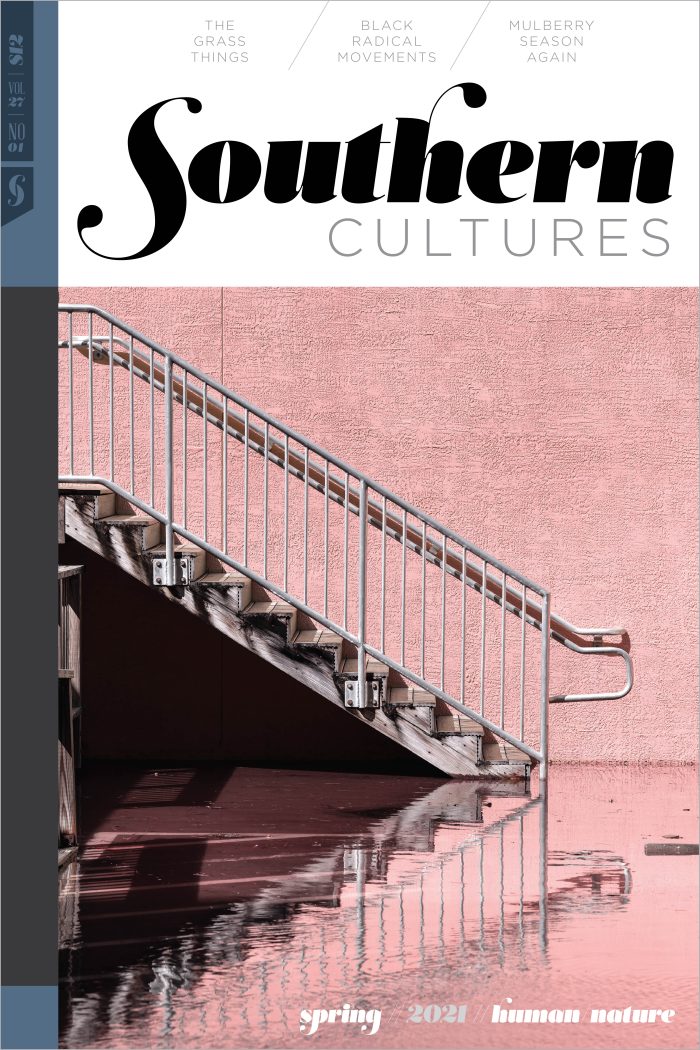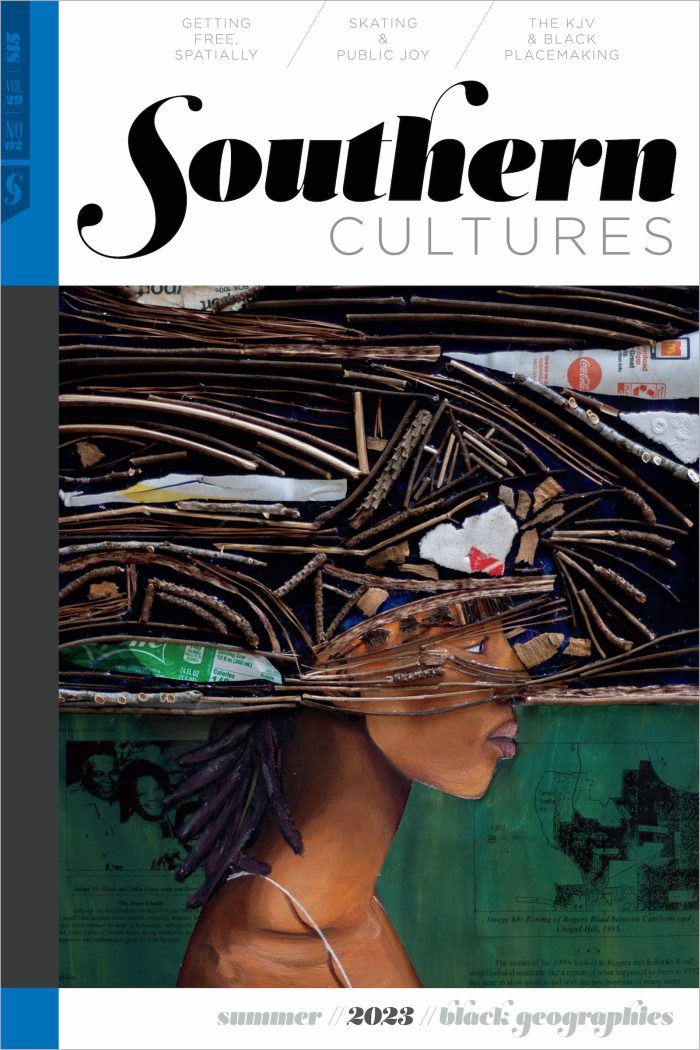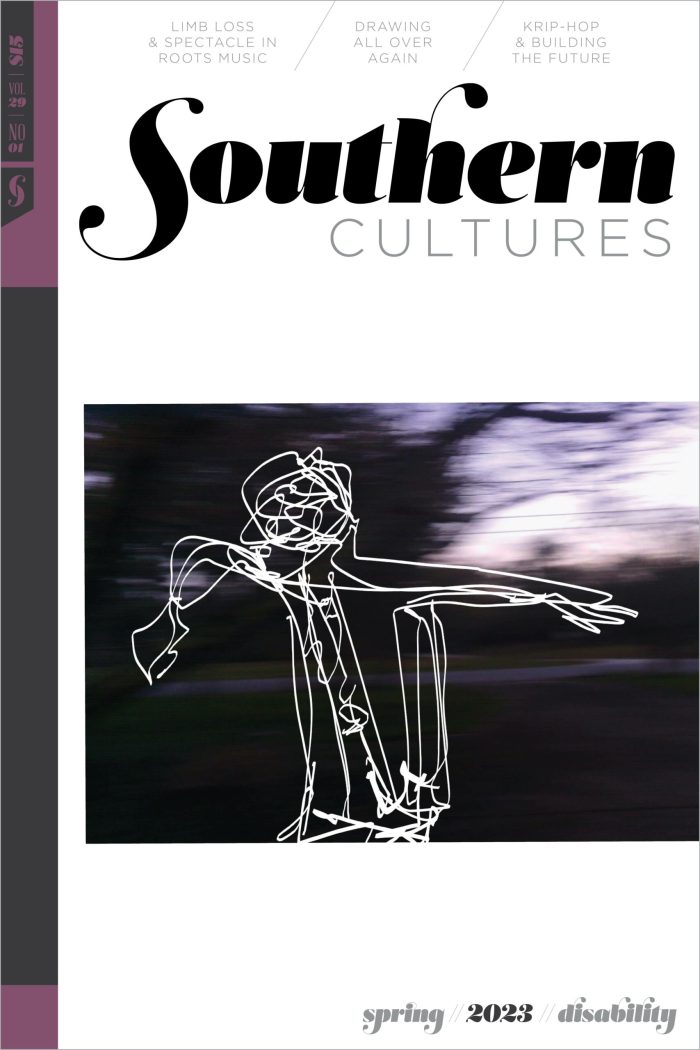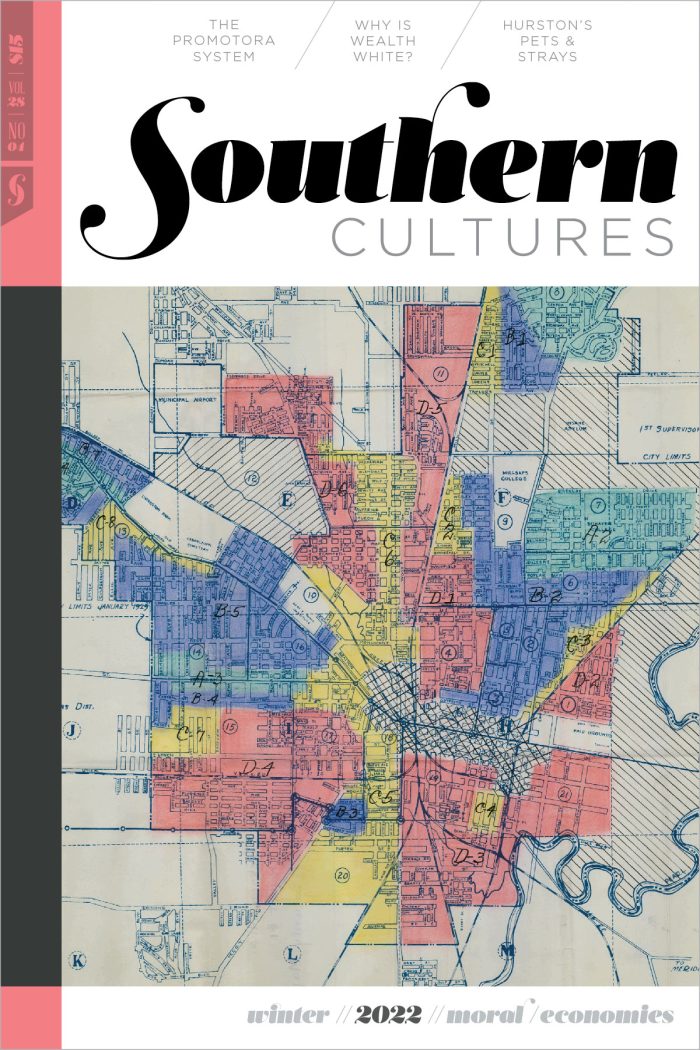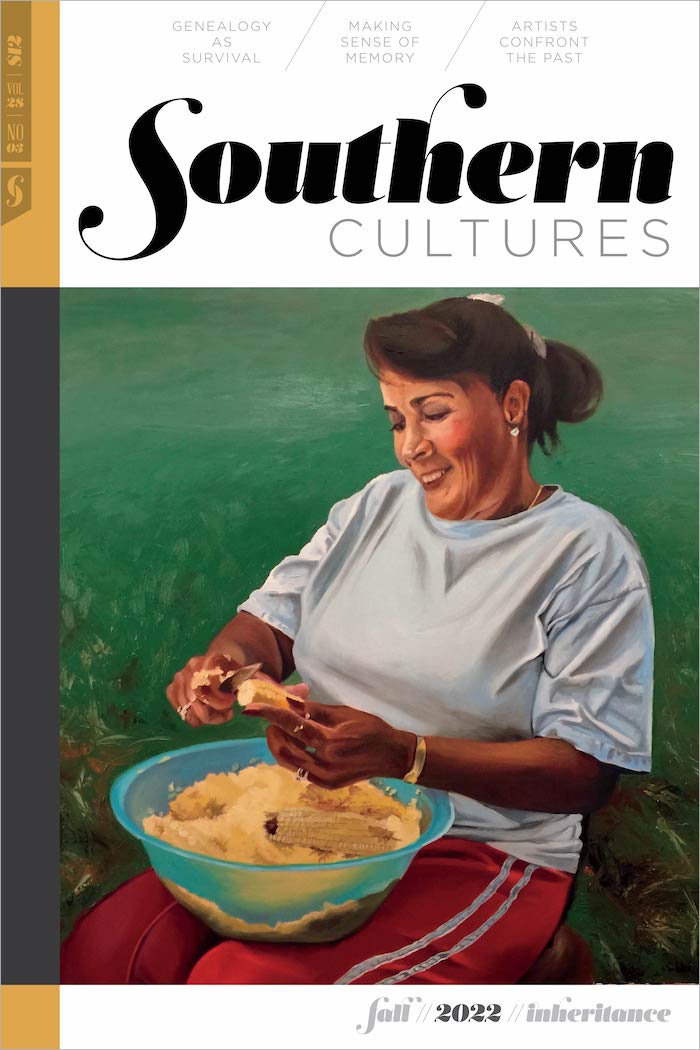Essay
BUY ACCESS
by Marcie Cohen Ferris
“I am struck by the deeply physical and emotional engagement with landscape that these scholars, writers, and artists reveal.” Welcome to this special Human/Nature issue of Southern Cultures. We are honored to have historian Andy Horowitz as our guest editor, on the heels of his brilliant new book Katrina: A History, 1915–2015, published in 2020. »
Essay
by Andy Horowitz
On November 1, 1952, the United States detonated a hydrogen bomb on Elugelab, a small island in a chain of coral islands in the Pacific Ocean called Enewetak Atoll. As the mushroom cloud cleared, two F-84 jets flew over the site. Their cameras documented an absence. Elugelab was gone. In its place was a crater »
Snapshot
BUY ACCESS
by Lisa McCarty
Black Mountain, North Carolina As I walked up the hill with my camera, the Quiet House slowly came into view. I didn’t recognize it at first. I had memorized the photographs that Hazel Larsen Archer and Robert Rauschenberg made of the stone sanctuary and imagined a scene closer to their vision. But over seventy years »
Memoir
An Indigenous Reflection on Bison in Louisiana
by Jeffery U. Darensbourg
A few months ago, longing for an ancestral experience I’ve never had, I went on a bison hunt to Costco, where it is possible to buy rectangular packets of mushy ground meat. While there, I spied another shrink-wrapped package in the prepared foods section, this one containing pastrami beef ribs from a company in Austin. »
Snapshot
BUY ACCESS
by Laura Saunders
Elliston, Virginia Musician Laney Sullivan has been a powerful, persistent advocate for environmental accountability and efforts to stop the Mountain Valley Pipeline (MVP) and recently cancelled Atlantic Coast Pipeline. Her band Holy River has played countless fundraisers and its members have been leaders in connecting artists with impacted communities along both routes.
Environment
by Glenda Elizabeth Gilmore
Art provides a powerful historical archive through which we can see our lost environmental past. In 1915, the artist Romare Bearden left the South at the age of four; decades later, he rendered evocative depictions of the southern natural world. His paintings and collages capture the lush bounty of city gardens and the women who »
Snapshot
BUY ACCESS
by Anastasia Samoylova
Miami, Florida The Tea Room is part of my FloodZone project, which looks at the subtle traces and signs of what is happening to the southern United States as it comes to terms with rising sea levels. The photograph was taken in Miami’s Vizcaya Gardens on Biscayne Bay after heavy rain. The tide is high »
Essay
by Joshua B. Guild
In the sweltering summer of 2010, as thousands of barrels of crude oil from the Deepwater Horizon oil rig explosion that April gushed daily into the Gulf of Mexico, sixty-two-year-old Malik Rahim took an unusual course of action. He got on his bike. The New Orleans native and lifelong organizer announced his intention to cycle »
Poetry
BUY ACCESS
by RaMell Ross
Hale County, Alabama LEDus stand here ____ future dinosaurnear the errors of three hands clappingwhat indifferent god particle sparking,through the strong ear and out the other.perhaps forgetting some string theory dangling,out inside the dinning deafness
Essay
BUY ACCESS
On the Legacies of Displacement and Marronage as Black Ecologies
by Justin Hosbey,
J.T. Roane
“‘I didn’t grow up with a disdain for free people of color, or for that area. But I grew up knowing that they wasn’t us.’” This is a brief reflection on water, swamps, bayous, wetlands, and Black life in the United States, and the forms of freedom and racialized unfreedom that these ecologies have facilitated. »
Snapshot
BUY ACCESS
by Aaron Turner
Arlington, Tennessee Pictured here is my maternal grandfather Aaron, the man I am named after. During his entire life, he worked with his hands, a self-taught carpenter and contractor. His life started in Crawfordsville, Arkansas, then he moved on to Earle, Arkansas, where he, his father, and his brothers grew cotton and sold their harvest »
Photo Essay
by Jeremiah Ariaz
While riding my motorcycle on Louisiana Highway 77 in 2014, I encountered a group of nearly fifty people on horseback. They commanded the narrow, two-lane road that runs along Bayou Grosse Tete, and I pulled off to the side for them to pass. As they rode by, I retrieved my camera from the saddlebag of »
Snapshot
BUY ACCESS
by Monique Verdin
Bvlbancha: St. Bernard Parish, Louisiana Where does your water come from? How do we treat water? How is water treated? I’ll never forget, when I was about twenty, how I watched as my father made his way down the bank of the Mississippi to water’s edge, on a cold December day, to wash his face »
Essay
Race, Environmentalism, and Injustice on Hilton Head Island, South Carolina, 1969–1970
by Madison W. Cates
On a steamy June afternoon in 1970, a crowd gathered outside the Sea Pines Company’s sprawling headquarters on the southern end of Hilton Head Island, South Carolina. Led by the Rev. I. DeQuincey Newman of the South Carolina NAACP, fifty African American protestors came to deliver a message to Charles Fraser, the head of Sea »
Snapshot
BUY ACCESS
by Justin Cook
From “Tide and Time” | Salvo, North Carolina Jean Hooper, eighty-five, stands in the Pamlico Sound at the Salvo Day Use Area. She was born on Hatteras Island and has watched the sea steadily reshape the only home she’s ever known. Behind her is the Salvo Community Cemetery, which is slowly washing into the sound. »
Memoir
And Other Minor Comforts Between Major Upheavals
by Lisa Sorg
The sweetest mulberries in Durham, North Carolina, grow in Maplewood Cemetery, on a tree that shades the grave of Leon Jeffers. Every year, in late May, I forage my way downtown, heading north from the Lakewood neighborhood. The first tree teems with a swarm of bees so profuse that the branches seem to vibrate. The »
Snapshot
BUY ACCESS
by Richard Knox Robinson
Reedville, Virginia The plastic-draped wooden structure in Fish Display welcomes you to Reedville, Virginia. Vastly out of proportion to its surroundings, it celebrates the role commercial fishing has played in “The Town Fish Built.” As the town’s unofficial symbol, it is just one of the vernacular structures that dot the region, taking pride of place »
Photo Essay
by Will Warasila,
Anne Branigin
At first, you’re not quite sure what you’re looking at: a windshield blotted like a Jackson Pollock painting; twin smokestacks squatting over pale water; a sawn tree stump, so red at its center you’d think it was bleeding; land so dry it looks like a rash. These are the images photographer Will Warasila captured in »
Snapshot
BUY ACCESS
by Timothy Ivy
Thaxton, Mississippi We come from the very land and water on which we depend for our survival. As the world turns, life also revolves. Spring gives us life. Summer gives us growth. In autumn, leaves fall and plants wither, becoming food for new life as the seasons turn back to spring. We produce from the »
Memoir
by Anna Zeide
When I was ten, for my father’s fifty-seventh birthday, I made him an acrostic poem card. After the “B” for “Brave” and the “R” for “Really Wonderful” in his first name BORIS was the “E” for “Expert on Aldo Leopold” in our last name ZEIDE. Aldo Leopold, as in the renowned author of A Sand »
Poetry
BUY ACCESS
by Nickole Brown
––for Mary Oliver Ain’t no foxes here, Mary. Ain’t no grasshoppers restingin my picnic palm. Ain’t too many creatures worth a poem like yours, just mewling strays tucked under the dangerous warmthof a pickup’s hood, just poodles with painted nails clicking pink across mama’s linoleum floor—so few animals left to this chain-storesprawl, this clocked-in, bottled, »
